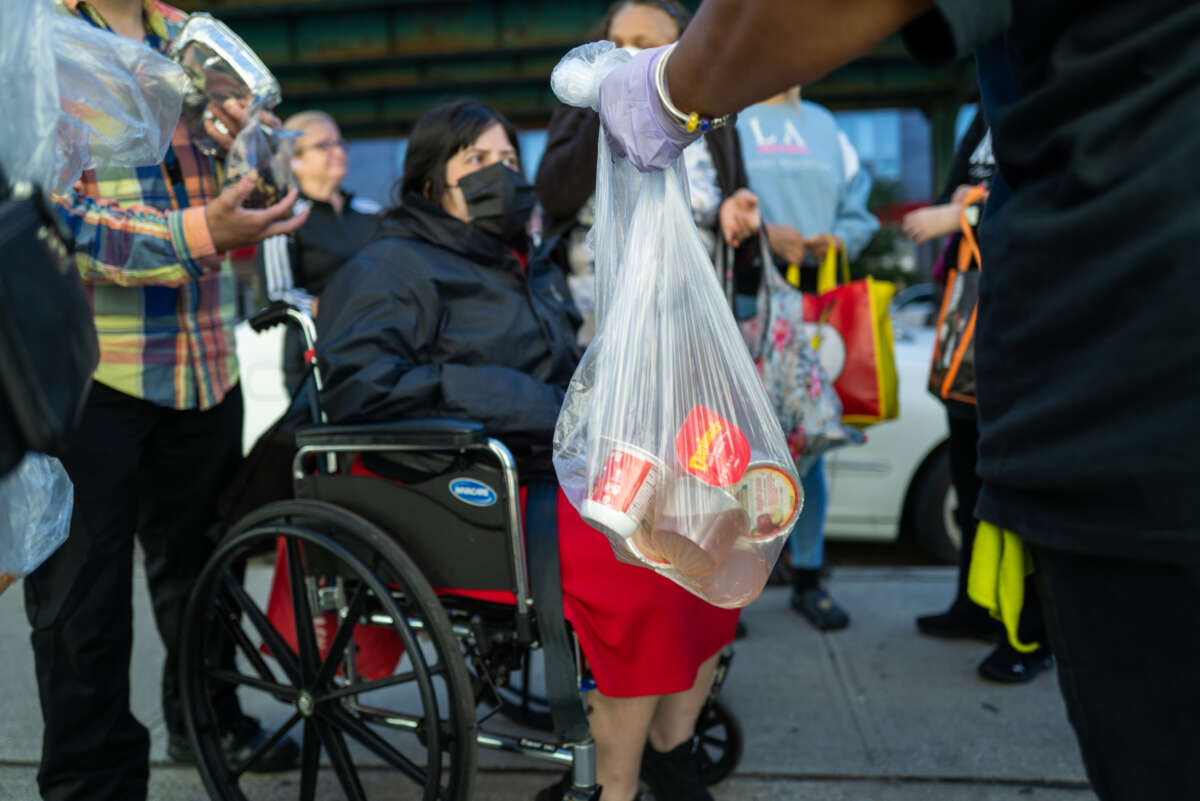Did you know that Truthout is a nonprofit and independently funded by readers like you? If you value what we do, please support our work with a donation.
Hundreds of thousands of older Americans could soon be at risk of losing federal food aid and falling deeper into poverty due to a provision of the new debt ceiling agreement that expands work requirements in the Supplemental Nutrition Assistance Program, a change that comes as food banks across the United States are seeing demand surge.
The deal that the Biden White House reached with House Republicans over the weekend would broaden the age range of SNAP recipients required to perform a certain amount of work or employment training each week. Under current law, SNAP recipients between the ages of 18 and 49 who don’t have dependents and are deemed able-bodied must demonstrate that they are working or taking part in work training for at least 20 hours a week to continue receiving benefits.
People who don’t meet the work requirements are often limited to just three months of SNAP benefits every three years — a time limit that was suspended during the Covid-19 pandemic but is now returning, putting millions at risk of losing aid.
The debt ceiling agreement, if approved by Congress, would raise the work requirement age ceiling to 54, a change that anti-hunger activists say builds on a punitive policy that has proven ineffective at boosting employment. The deal’s work requirement expansion will sunset in 2030.
Republicans were adamant that the agreement include additional work requirements for recipients of SNAP and other aid programs for poor Americans, even as their party worked to shield wealthy tax cheats and pile more money into the Pentagon’s coffers.
“The great contradiction of this debt ceiling deal is that, while poverty is the fourth-leading cause of death, this deal will make it harder to get food stamps but easier to spend money on war,” said Rev. Dr. William J. Barber II, co-chair of the Poor People’s Campaign.
Luis Guardia, president of the Food Research and Action Center, warned Monday that the new rules “will only deepen hunger and poverty” for older adults who are unemployed or underemployed. Most adult SNAP recipients work, but their jobs are often highly precarious and low-paying.
“Cutting off food for people unless they document sufficient hours of work does not improve their chances to secure family-sustaining wages, but does increase their food hardship,” said Guardia. “Food is a basic human right and should not have a time limit. The most meaningful, effective, and equitable relief is to pass H.R. 1510 for a permanent end to SNAP time limits on all groups.”
Advocates fear that an expansion of SNAP work requirements and the debt ceiling agreement’s caps on federal spending will compound the nation’s growing hunger crisis. A recent Feeding America survey found that a majority of U.S. food banks reported growing demand in March following the termination of an emergency SNAP benefit expansion enacted in the early stages of the pandemic.
SNAP recipients now receive around $6 a day per person on average, leaving many struggling to afford enough food — particularly as prices remain elevated.
The White House has touted the debt limit deal’s exemption of veterans and people who are homeless from SNAP work requirements, but policy analysts said that doesn’t justify imposing the mandates on others.
Sharon Parrott, president of the Center on Budget and Policy Priorities, said the new SNAP work rules would put “hundreds of thousands of older adults aged 50-54 at risk of losing food assistance, including a large number of women.”
“Doubling down on the existing, failed SNAP work-reporting requirement for adults aged 18-49 without children, this provision ignores the strong evidence that it takes food assistance away from large numbers of people without increasing employment or earnings,” said Parrott.
“A large share of low-income adults in this age range are in poor health; many of them will lose basic assistance they need to buy groceries because they aren’t able to meet the work-reporting requirement; and the exemption system, notoriously laden with red tape, won’t work,” she continued. “Decades of experience under the existing policy shows that many of those whose SNAP benefits are taken away should have been exempt. Those newly at risk of losing food assistance have very low incomes, typically well below the poverty line, and will be pushed even deeper into poverty when they lose SNAP.”
Progressive lawmakers expressed outrage at the GOP’s proposed work requirements during the negotiation process, but it’s unclear if they will oppose the debt ceiling legislation because of the rules included in the final agreement.
Rep. Pramila Jayapal (D-Wash.), the chair of the Congressional Progressive Caucus, said Sunday that SNAP work requirements are “absolutely terrible policy.”
“I think it is really unfortunate that the president opened the door to this,” Jayapal added.
Trump is silencing political dissent. We appeal for your support.
Progressive nonprofits are the latest target caught in Trump’s crosshairs. With the aim of eliminating political opposition, Trump and his sycophants are working to curb government funding, constrain private foundations, and even cut tax-exempt status from organizations he dislikes.
We’re concerned, because Truthout is not immune to such bad-faith attacks.
We can only resist Trump’s attacks by cultivating a strong base of support. The right-wing mediasphere is funded comfortably by billionaire owners and venture capitalist philanthropists. At Truthout, we have you.
Our fundraising campaign is over, but we fell a bit short and still need your help. Please take a meaningful action in the fight against authoritarianism: make a one-time or monthly donation to Truthout. If you have the means, please dig deep.
